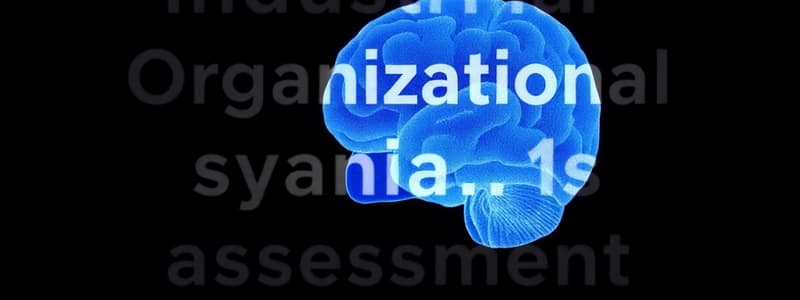Podcast
Questions and Answers
What does Fleishman's taxonomy of 52 abilities NOT include?
What does Fleishman's taxonomy of 52 abilities NOT include?
- Physical abilities
- Emotional abilities (correct)
- Perceptual-motor abilities
- Cognitive abilities
Which of these is NOT a fundamental assumption of the individual differences model?
Which of these is NOT a fundamental assumption of the individual differences model?
- Attributes can be measured accurately
- Adults have a variety of attributes that remain relatively stable over time
- Different jobs require different attributes
- Individuals have a high degree of influence on their own attributes (correct)
Which of the following is NOT a criticism of individual assessment?
Which of the following is NOT a criticism of individual assessment?
- Many infringe on candidate privacy
- Individual assessments are not standardized (correct)
- Not as rigorously validated as other assessments
- Summaries may be influenced by only one or two aspects of the process
Which of the following is most likely to rank high on the Five Factor Model trait of Conscientiousness?
Which of the following is most likely to rank high on the Five Factor Model trait of Conscientiousness?
Which of the following is a key characteristic of speed tests?
Which of the following is a key characteristic of speed tests?
Which of the following is an example of a competency?
Which of the following is an example of a competency?
What is the purpose of a screen-out test?
What is the purpose of a screen-out test?
What is the primary purpose of a situational interview?
What is the primary purpose of a situational interview?
Flashcards
Individual Differences Model
Individual Differences Model
A framework emphasizing that different jobs require distinct attributes.
Fleishman's Taxonomy
Fleishman's Taxonomy
A classification of 52 abilities into cognitive, perceptual-motor, and physical categories.
General Intelligence (g)
General Intelligence (g)
Measures knowledge acquisition, reasoning, and problem-solving abilities.
Five Factor Model
Five Factor Model
Signup and view all the flashcards
Screen-out Tests
Screen-out Tests
Signup and view all the flashcards
Situational Interview
Situational Interview
Signup and view all the flashcards
Speed Tests
Speed Tests
Signup and view all the flashcards
Competencies
Competencies
Signup and view all the flashcards
Study Notes
Individual Differences in I-O Psychology
- I-O psychologists assume different jobs need varied attributes.
- Adult attributes remain relatively consistent over time.
- Accurate measurement of attributes is possible.
Fleishman's Taxonomy
- Fleishman's 52 abilities are categorized into:
- Cognitive abilities
- Perceptual-motor abilities
- Physical abilities
Measures of "g"
- Assess knowledge acquisition.
- Measure reasoning ability.
- Evaluate problem-solving ability.
- Predictive value increases with job complexity.
The Five Factor Model
- Describes typical responses to events and people.
- Highlights personality's importance in job performance.
- Based on statistical and conceptual analyses.
Integrity and the Five Factor Model
- High integrity correlates with high scores in:
- Emotional stability
- Agreeableness
- Conscientiousness
Faking on Personality Tests
- Self-presentation may be involved, not necessarily intentional faking.
- Some equate self-efficacy with faking.
- Candidates might present themselves as ideal applicants.
Skills and Competencies
- Skills are practiced actions.
- Competencies combine skills, knowledge, abilities, and personality for job success.
Assessments and Test Batteries
- A test battery is a collection of different tests.
Speed Tests
- Impose strict and challenging time limits.
- Most test-takers often cannot complete the test within the time.
- Potential for unfairness due to speed emphasis.
Psychomotor Ability Tests
- Evaluate complex or straightforward tasks.
- Usually require dexterity.
- Measure coordinated limb movement.
Screening Tests
- Screen-out tests identify psychopathology.
- Screen-in tests identify personality variations within normal ranges.
Criticisms of Individual Assessments
- Less rigorous validation compared to other assessments.
- Summaries can be influenced by one or two aspects only.
- Often infringe on candidate privacy.
Situational Interviews
- Candidates describe responses to hypothetical workplace situations (e.g., dealing with a dissatisfied client).
Work Sample Tests
- Tasks and equipment closely mirror actual job conditions.
Incremental Validity
- A new assessment adds value beyond existing methods.
- Example: An interview improves a general mental ability test's predictive validity.
Graphology
- Assesses personality based on handwriting characteristics.
Drug Tests
- Commonly predict absenteeism and involuntary terminations.
Studying That Suits You
Use AI to generate personalized quizzes and flashcards to suit your learning preferences.




